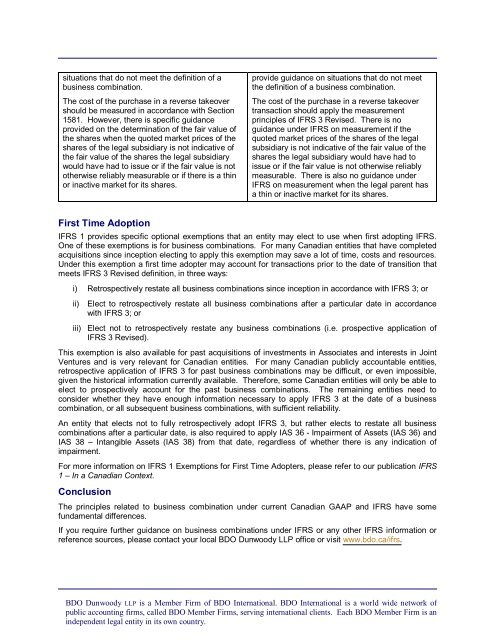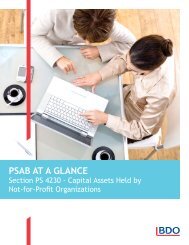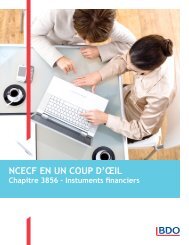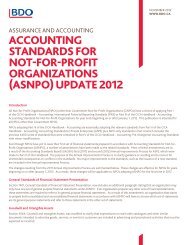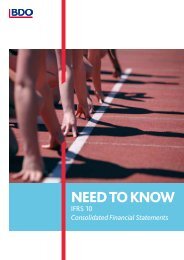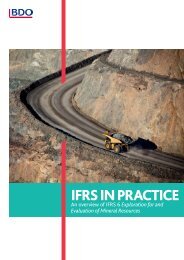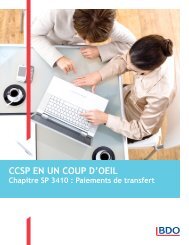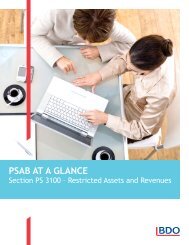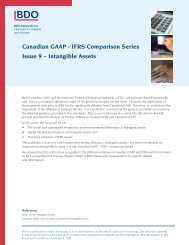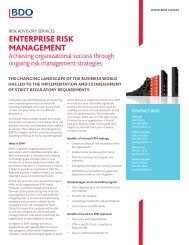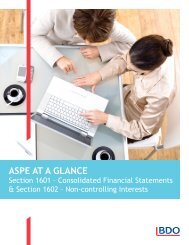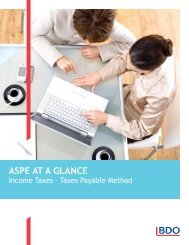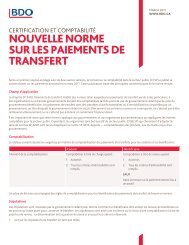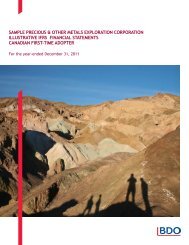Business Combinations - IFRS Canadian GAAP Differences Series
Business Combinations - IFRS Canadian GAAP Differences Series
Business Combinations - IFRS Canadian GAAP Differences Series
You also want an ePaper? Increase the reach of your titles
YUMPU automatically turns print PDFs into web optimized ePapers that Google loves.
situations that do not meet the definition of abusiness combination.The cost of the purchase in a reverse takeovershould be measured in accordance with Section1581. However, there is specific guidanceprovided on the determination of the fair value ofthe shares when the quoted market prices of theshares of the legal subsidiary is not indicative ofthe fair value of the shares the legal subsidiarywould have had to issue or if the fair value is nototherwise reliably measurable or if there is a thinor inactive market for its shares.provide guidance on situations that do not meetthe definition of a business combination.The cost of the purchase in a reverse takeovertransaction should apply the measurementprinciples of <strong>IFRS</strong> 3 Revised. There is noguidance under <strong>IFRS</strong> on measurement if thequoted market prices of the shares of the legalsubsidiary is not indicative of the fair value of theshares the legal subsidiary would have had toissue or if the fair value is not otherwise reliablymeasurable. There is also no guidance under<strong>IFRS</strong> on measurement when the legal parent hasa thin or inactive market for its shares.First Time Adoption<strong>IFRS</strong> 1 provides specific optional exemptions that an entity may elect to use when first adopting <strong>IFRS</strong>.One of these exemptions is for business combinations. For many <strong>Canadian</strong> entities that have completedacquisitions since inception electing to apply this exemption may save a lot of time, costs and resources.Under this exemption a first time adopter may account for transactions prior to the date of transition thatmeets <strong>IFRS</strong> 3 Revised definition, in three ways:i) Retrospectively restate all business combinations since inception in accordance with <strong>IFRS</strong> 3; orii) Elect to retrospectively restate all business combinations after a particular date in accordancewith <strong>IFRS</strong> 3; oriii) Elect not to retrospectively restate any business combinations (i.e. prospective application of<strong>IFRS</strong> 3 Revised).This exemption is also available for past acquisitions of investments in Associates and interests in JointVentures and is very relevant for <strong>Canadian</strong> entities. For many <strong>Canadian</strong> publicly accountable entities,retrospective application of <strong>IFRS</strong> 3 for past business combinations may be difficult, or even impossible,given the historical information currently available. Therefore, some <strong>Canadian</strong> entities will only be able toelect to prospectively account for the past business combinations. The remaining entities need toconsider whether they have enough information necessary to apply <strong>IFRS</strong> 3 at the date of a businesscombination, or all subsequent business combinations, with sufficient reliability.An entity that elects not to fully retrospectively adopt <strong>IFRS</strong> 3, but rather elects to restate all businesscombinations after a particular date, is also required to apply IAS 36 - Impairment of Assets (IAS 36) andIAS 38 – Intangible Assets (IAS 38) from that date, regardless of whether there is any indication ofimpairment.For more information on <strong>IFRS</strong> 1 Exemptions for First Time Adopters, please refer to our publication <strong>IFRS</strong>1 – In a <strong>Canadian</strong> Context.ConclusionThe principles related to business combination under current <strong>Canadian</strong> <strong>GAAP</strong> and <strong>IFRS</strong> have somefundamental differences.If you require further guidance on business combinations under <strong>IFRS</strong> or any other <strong>IFRS</strong> information orreference sources, please contact your local BDO Dunwoody LLP office or visit www.bdo.ca/ifrs.BDO Dunwoody LLP is a Member Firm of BDO International. BDO International is a world wide network ofpublic accounting firms, called BDO Member Firms, serving international clients. Each BDO Member Firm is anindependent legal entity in its own country.


